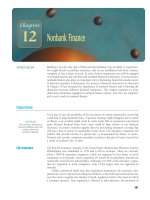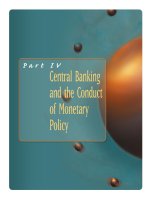CHAPTER 1 1 WHY STUDY MONEY BANKING AND FINANCIAL MARKETS sv1 0
Bạn đang xem bản rút gọn của tài liệu. Xem và tải ngay bản đầy đủ của tài liệu tại đây (987.36 KB, 13 trang )
22/05/2018
MONEY AND BANKING
Tran Thi Minh Tram
Email:
1
Chapter 1.1
Why study money,
banking, and
financial markets?
Assigned reading: chapter 1
2
Why study money, banking, and
financial markets?
Why study money and monetary policy?
1. Influence on business cycles, inflation, and interest rates
Why study financial markets?
1. Channel funds from savers to investors, thereby promoting
economic efficiency
2. Affect personal wealth and behavior of business firms
Why study banking and financial institutions?
1. Financial intermediation
Helps get funds from savers to investors
2. Banks and money supply
Crucial role in creation of money
3. Financial innovation
3
1
22/05/2018
WHY STUDY MONEY?
• Money (money supply): anything that is
generally accepted in payment for goods or
services or in the repayment of debts.
4
Why study money?
• Money (money supply): linked to changes in
economic variables that affect all of us and
are important to the health of the economy.
– Inflation
– Business cycle
– Interest rate
5
Money and inflation
• Price of a movie ticket:
– 30 years ago: $1
– Now: $10
6
2
22/05/2018
Money and inflation
7
Money and inflation
8
Money and inflation
• The aggregate price level is the
average price of goods and services in an
economy
• A continual rise in the price level (inflation)
affects all economic players
• Data shows a connection between the money
supply and the price level
9
3
22/05/2018
Money and inflation
• Such evidence led Milton Friedman, a Nobel
laureate in economics , to make the famous
statement,
"Inflation is always and everywhere a monetary
phenomenon."
10
Money and business cycles
11
Money and business cycles
• In 1981-1982, total production of goods and services (called aggregate
output) in the U.S. economy fell and the unemployment rate (the
percentage of the available labor force unemployed) rose to over 10 % .
• After 1982, the economy began to expand rapidly, and by 1989 the
unemployment rate had declined to 5 % .
• In 1990, the eight-year expansion came to an end, with the unemployment
rate rising above 7 % .
• The economy bottomed out in 1991 , and the subsequent recovery was the
longest in U.S. history, with the unemployment rate falling to around 4%.
• A mild economic downturn began in March 2001 , with unemployment
rising to 6%;
• The economy began to recover in November 2001 with unemployment
eventually declining to a low of 4.4% .
• Starting in December 2007, the economy went into recession and the
unemployment rate rose to well all over 7%.
12
4
22/05/2018
Money and business cycles
• Why did the economy…?
– expand from 1982 to 1990
– contract in 1990 to 1991
– boom again from 1991 to 2001
– contract again in 200 1
– recover thereafter
– and contract again in 2007
13
Money and business cycles
• Evidence suggests that money plays an
important role in generating business cycles the upward and downward movement of
aggregate output produced in the economy.
• Business cycles affect all of us in immediate
and important ways
• Monetary theory ties changes in the money
supply to changes in aggregate economic
activity and the price level
14
Money and interest
15
5
22/05/2018
Money and interest
• Interest is the cost of capital.
• In addition to other factors, money plays an
important role in interest-rate fluctuations,
which are of great concern to businesses and
consumers
16
Conduct of monetary policy
• Money can affect many economic variables
that are important to the well-being of our
economy.
• Politicians and policy makers throughout the
world care about the conduct of monetary
policy - the management of money and
interest rates.
• The organization responsible for the conduct
of a nation's monetary policy is the central
bank.
17
Fiscal policy
• Fiscal policy involves decisions about
government spending and taxation.
– A budget deficit is the excess of government
expenditures over tax revenues for a particular
time period, typically a year.
– A budget surplus arises when tax revenues exceed
government expenditures.
– Any deficit must be financed by borrowing
18
6
22/05/2018
Fiscal policy
19
Fiscal policy
• The government must finance any deficit by
borrowing
• While a budget surplus leads to a lower
government debt burden
20
Fiscal policy and monetary policy
• There may be statements that budget
surpluses are a good thing while deficits are
undesirable.
• We explore the accuracy of such claims by
seeing how budget deficits might lead to a
financial crisis as they did in Argentina in
2001 .
• We examine why deficits might result in a
higher rate of money growth, a higher rate
of inflation, and higher interest rates.
21
7
22/05/2018
WHY STUDY FINANCIAL MARKETS
22
Why study financial markets
• Financial markets are markets in which
funds are transferred from people who
have an excess of available funds to people
who have a shortage.
23
Bond market
24
8
22/05/2018
Stock market
25
Foreign Exchange Market
26
Why study financial markets
• Financial markets:
– promoting greater economic efficiency
channelling funds from people who do not have a
productive use for them to those who do.
– well-functioning financial markets produce high
economic growth
– poorly performing financial markets leave many
countries in the world remain desperately poor.
• Activities in financial markets have direct
effects on personal wealth, the behaviour of
businesses and consumers, and the cyclical
performance of the economy.
27
9
22/05/2018
WHY STUDY FINANCIAL INSTITUTIONS
AND BANKING?
28
Why study financial institutions and
banking?
• The financial system is complex, comprising many
different types of private sector financial
institutions, including banks, insurance
companies, mutual funds, finance companies, and
investment banks, all of which are heavily
regulated by the government.
• Financial intermediaries are institutions that
borrow funds from people who have saved and in
turn make loans to others .
29
Why study financial institutions and
banking?
• Financial Intermediation
– Helps get funds from savers to investors
through bond/equity/foreign exchange markets
• At times , the financial system seizes up and
produces financial crises - major disruptions in
financial markets that are characterized by sharp
declines in asset prices and the failures of many
financial and nonfinancial firms.
30
10
22/05/2018
Why study financial institutions and
banking?
• Financial innovation shows us
– how creative thinking on the pan of financial
institutions can lead to higher profits.
– how the dramatic improvements in information
technology have led to new means of delivering
financial services electronically
– what has become known as e-finance
31
WHY STUDY INTERNATIONAL
FINANCE
32
Why study international finance
• What have these fluctuations in the
exchange rate meant to the American
public and businesses?
• Fluctuations in the foreign exchange
markets have major consequences for the
American economy.
33
11
22/05/2018
Why study international finance
• The globalization of financial markets has
accelerated at a rapid pace in recent years.
– For funds to be transferred from one country to another,
they have to be converted from the currency in the
country of origin (say, dollars) into the currency of the
country they are going to (say, euros).
– The foreign exchange market is where this conversion
takes place , so it is instrumental in moving funds
between countries.
• It is also important because it is where the foreign
exchange rate - the price of one country's currency
in terms of another's, is determined.
34
HOW WE STUDY MONEY AND
BANKING
• To study well:
– Use unifying framework - Learn what really
matters without having to memorize a mass of
dull facts
– Use a few basic economic concepts to organize
your thinking
– Use models to explain various phenomena
– Solve end-of-chapter problems (review & apply)
• Function better in real world:
– Tools to follow the financial news
35
How we study money and banking
Basic Analytic Framework
1. Simplified approach to the demand for assets
2. Concept of equilibrium
3. Basic supply and demand approach to understand behavior in financial
markets
4. Search for profits
5. Transactions cost and asymmetric information approach to financial
structure
6. Aggregate supply and demand analysis
Features
1. Case studies
2. Applications
3. Special-interest boxes
4. Following the Financial News boxes
5. Reading the financial pages
6. Web Exercises and URLs
36
12
22/05/2018
Five core principles of Money and
Banking
1.
2.
3.
4.
Time has value
Risk requires compensation
Information is the basis for decisions
Markets determine prices and allocation
resources
5. Stability improves welfare
37
13









